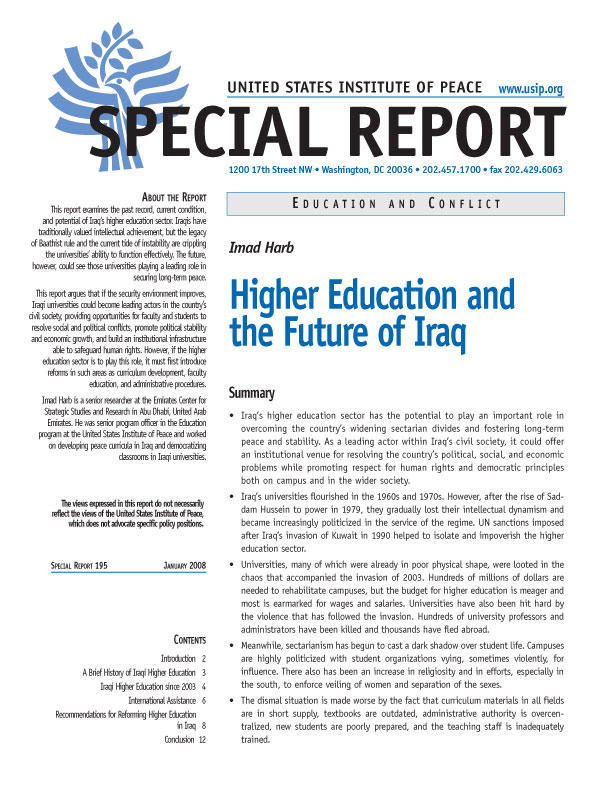Higher Education and the Future of Iraq
Iraqis have traditionally valued intellectual achievement, but the legacy of Baathist rule and the current tide of instability have crippled universities. The future, however, could see institutions play a leading role in securing long-term peace.

Summary
- Iraq’s higher education sector has the potential to play an important role in overcoming the country’s widening sectarian divides and fostering long-term peace and stability. As a leading actor within Iraq’s civil society, it could offer an institutional venue for resolving the country’s political, social, and economic problems while promoting respect for human rights and democratic principles both on campus and in the wider society.
- Iraq’s universities flourished in the 1960s and 1970s. However, after the rise of Saddam Hussein to power in 1979, they gradually lost their intellectual dynamism and became increasingly politicized in the service of the regime. UN sanctions imposed after Iraq’s invasion of Kuwait in 1990 helped to isolate and impoverish the higher education sector.
- Universities, many of which were already in poor physical shape, were looted in the chaos that accompanied the invasion of 2003. Hundreds of millions of dollars are needed to rehabilitate campuses, but the budget for higher education is meager and most is earmarked for wages and salaries. Universities have also been hit hard by the violence that has followed the invasion. Hundreds of university professors and administrators have been killed and thousands have fled abroad.
- Meanwhile, sectarianism has begun to cast a dark shadow over student life. Campuses are highly politicized with student organizations vying, sometimes violently, for influence. There also has been an increase in religiosity and in efforts, especially in the south, to enforce veiling of women and separation of the sexes.
- The dismal situation is made worse by the fact that curriculum materials in all fields are in short supply, textbooks are outdated, administrative authority is overcentralized, new students are poorly prepared, and the teaching staff is inadequately trained.
- The international community has made a variety of efforts to support the rejuvenation of Iraq’s universities by donating funds, providing expertise, and launching cooperative initiatives.
- International assistance has been helpful, but if the higher education sector is to reclaim its earlier dynamism and play a leading role in national reconstruction, it needs a comprehensive program of reform.
- Any package of reforms must emphasize the need to update and expand the curriculum. Universities should embrace new disciplines that will instruct students in conflict resolution, reconciliation, intercommunal tolerance, institution building, civil society development, women’s studies, democracy, and human rights.
- Another pressing requirement is to give academics and students access to foreign scholars and publications through a series of international seminars and workshops and via a large-scale program of translating foreign-language books and journals into Arabic. Efforts must also be made to train faculty in new technologies and subjects and to increase the number of faculty who hold doctoral degrees. Foreign donors and governments should also offer scholarships abroad to Iraqi students and professors to help alleviate the burden of training a new class of university personnel.
- Like other public-sector institutions, higher education institutions are overcentralized and need more freedom to determine their own policies, procedures, and curricula.
- Iraqis cannot accomplish these reforms by themselves. They need the sustained support of foreign governments, international bodies, and non-governmental organizations if they are to demonstrate how universities in a divided society can play a leading role in promoting civic peace.
About the Report
This report examines the past record, current condition, and potential of Iraq’s higher education sector. Iraqis have traditionally valued intellectual achievement, but the legacy of Baathist rule and the current tide of instability are crippling the universities’ ability to function effectively. The future, however, could see those universities playing a leading role in securing long-term peace.
This report argues that if the security environment improves, Iraqi universities could become leading actors in the country’s civil society, providing opportunities for faculty and students to resolve social and political conflicts, promote political stability and economic growth, and build an institutional infrastructure able to safeguard human rights. However, if the higher education sector is to play this role, it must first introduce reforms in such areas as curriculum development, faculty education, and administrative procedures.
Imad Harb is a senior researcher at the Emirates Center for Strategic Studies and Research in Abu Dhabi, United Arab Emirates. He was senior program officer in the Education program at the United States Institute of Peace and worked on developing peace curricula in Iraq and democratizing classrooms in Iraqi universities.



